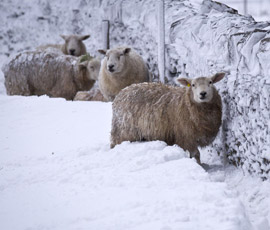Dead sheep must be disposed of for free

Sheep killed in the Cumbrian snow drifts must be collected and disposed of free of charge, the NFU has insisted.
The union called on DEFRA and National Fallen Stock Company (NFSCo) to help those farmers who have suffered heavy losses by providing a temporary, free collection service for animals killed by the snow.
More than 25,000 sheep and cattle are believed to have perished in the coldest March for 50 years.
Farms in the upland areas of Broughton, Millom, Eskdale, Wasdale, Langdale and Ulpha have been hit particularly hard, with snow drifts 20ft deep in places.
However, farmers who have lost animals in the blizzards will receive no compensation for their losses. And they will be faced with large replacement bills, the NFU said.
Esther Pritt, NFU secretary from the Broughton office, said: “The situation is desperate as most farmers I’m talking to in the area have already lost ewes and lambs numbering into the 80s and that is only what they’ve managed to find so far.
“It’s heart breaking to witness as they currently don’t know the full scale of their losses and really don’t want to think about the worst case scenario.
“Many ewes that initially survive later die of exhaustion or are aborting. The situation is serious. A lot of farmers simply haven’t got the money to get these animals collected.”
Alistair Mackintosh, who farms at Ravenglass in Muncaster, has lost 100 lambs and 20 ewes.
“There are a number of farmers with hundreds of sheep still unaccounted for,” said Mr Macintosh, Cumbria’s NFU representative.
“This extra burden to have these carcasses taken away at a cost is intolerable and an insult to the farmers who have suffered from a natural disaster.”
But DEFRA said it was not considering compensation at this stage.
“We’re allowing farmers to bury or burn animal carcasses on site and working with the National Fallen Stock Company to find a cheaper way for them to be removed,” said a DEFRA spokesman.
“We are also relaxing rules on driver hours to allow extra time for essential deliveries of animal feed and permitting farmers with red diesel in their tractors to help grit and clear snow from public roads.”
